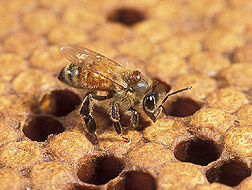This page has been archived and is being provided for reference purposes only. The page is no longer being updated, and therefore, links on the page may be invalid.
|
Read the magazine story to find out more. |
Fungus Provides Varroa Mite Relief for BeesBy Alfredo FloresOctober 14, 2004 A natural fungus could be a nonchemical alternative for beekeepers looking for ways to control the parasitic varroa mite, according to Agricultural Research Service scientists in Weslaco, Texas. For several years, scientists in the ARS Beneficial Insects Research Unit at Weslaco have been looking for a natural organism that's harmless to bees but kills the mites. New, nonchemical controls are needed because the mite has developed resistance to the only approved chemicals--fluvalinate and coumaphos--now used against varroa. So the researchers looked at various organisms, tried different dosages and application methods, and conducted toxicity tests. Finally, they selected strains of the fungus Metarhizium anisopliae that proved highly pathogenic to the mites. This potent fungus, which also kills termites, doesn't harm bees or affect queen reproduction. To test the fungus, the scientists coated plastic strips with dry fungal spores and placed them inside the hives. Since bees naturally attack anything entering their hives, they tried to chew the strips, thereby spreading the spores to the whole colony. In field trials, once the strips treated with M. anisopliae were inside the hives, several bees quickly made contact with the spores. Within 5 to10 minutes, all the bees in the hive were exposed to the fungus, and most of the mites on the bees died within three to five days. The fungus provided excellent control of varroa without impeding colony development or population size. Tests showed that Metarhizium was as effective as fluvalinate, even 42 days after application. The scientific team is now fine-tuning the strategy for transfer to producers. Read more about this research in the October 2004 issue of Agricultural Research magazine. ARS is the U.S. Department of Agriculture's chief scientific research agency. |

